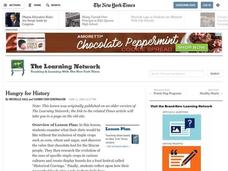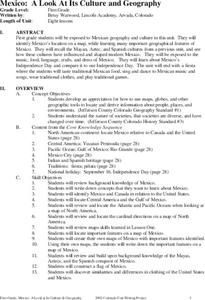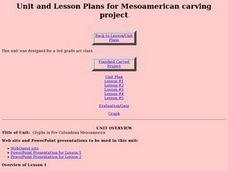Virginia Department of Education
World History and Geography to 1500 A.D.
Here's a great resource for your curriculum library. The 240-page packet, organized into units by topics, includes sample lesson plans, links to primary and secondary source documents, worksheets, activities, and sample assessments.
Curated OER
The Achievements and Challenges of Guatemala
High schoolers research the Mayan number and calendar system. They translate a variety of math problems from base-10 Arabic numbers into a base-20 Mayan representation. They discuss current challenges faced by the people in today's...
Curated OER
Mesoamerica: The History of Central America
Young scholars examine the role of women in Mesoamerica. They watch segments of the Discovery video "Mesoamerica: The History of Central America". After conducting further research pertaining to specific Mayan women, they write...
Curated OER
Will America Fall Apart Like the Maya?
Students work in teams to research ancient Mayan civilization as they simulate working for the President of the United States. He is concerned that if a civilization as technologically advanced as the Maya's could disappear, could the...
Curated OER
What a Gift!
What is considered a valuable gift? As the class will come to find out, what is considered a gift varies by time and location. After viewing images of a Mayan pot that depicts men giving cacao to the gods, learners research three...
New York City Department of Education
Geography and Early Peoples of the Western Hemisphere
Young historians discover the early people of the western hemisphere. The unit explores how the land changed, how it was used and homes of early Americans such as Incas, Mayans, Inuits, Aztecs, and Pueblos. Individuals also examine these...
Smithsonian Institution
Ceramica de los Ancestros
Scholars join a field expedition team to unearth a plethora of treasures from Central America. Artifacts listed in alphabetical order come with an informational blurb and a picture designed for participants to color. Activity pages...
Curated OER
Invertebrates in Mythology
Invertebrates play a prominent role in many myths across cultures. From Greece to Guatemala, see if you can identify the invertebrate of importance. Ten multiple-choice questions test your knowledge of mythology from around the world.
Curated OER
Maya Mystery
Students use the Internet and e-mail to research the Mayan culture. They participate in "Mayaquest" and create a multimedia presentation and a visual product of what they find in their research.
Curated OER
Hungry for History
Young scholars examine what their diets would be like without the inclusion of staple crops such as corn, wheat and sugar, and discover the value that chocolate had for the Mayan people. They create display boards for a food festival.
Facing History and Ourselves
Who Am I?
Sixth graders explore how people throughout time have responded to questions regarding identity. For this The House on Mango Street lesson plan, 6th graders create an identity chart for a fictional character and then write personal...
Curated OER
The Ancient Maya
Students explore the culture of the Mayans through a variety of activities. In this lesson about Maya, students analyze pictures in books and on websites, produce scale models of Maya architecture, and create Maya mosaics. Students study...
Curated OER
The Physics of the Planets: How 16th and 17th Century Physicist Helped Us Understand Our Solar System
Eighth graders draw the paths of the planets in the solar system. In this astronomy lesson, 8th graders calculate speed of objects using distance and time information. They research about the work of scientists in the 16th and 17th century.
Curated OER
Mexico: A Look At Its Culture and Geography
Students canvass the Mexican geography, culture, dress, language, crafts, and traditions in this unit of eight lessons. The Mexican Independance Day is compared to our own and the contributions of the Mayan, Azetec, and Spanish are...
Education Outside
Papermaking
Imagine recycling food scraps and using them to make paper. The directions are all here in a seven-page packet that details several paper-making strategies.
Curated OER
A Maya Masterpiece
Students analyze the symbols presented in a Maya artifact. They create collages that depict a theme related to contemporary life in their community, and write brief analyses explaining the symbolism of the images they chose.
Curated OER
Inside The Pyramids
Students research the use of pyramids in different cultures. For this ancient civilizations lesson, students watch "Inside the Pyramids." Students conduct further research on the topic and create magazine...
Curated OER
Anasazi/Mesoamerican/Andean: Time and Cultural Passages
Seventh graders role play the position of someone in one of six different civilization groups. They research the group's development, advancement and fall of their civilization. They create a presentation to share the information with...
Curated OER
Different Ways to Count
Fourth graders investigate various number systems and ways of counting. In this various number systems and ways of counting activity, 4th graders discuss number systems from around the world. Students practice counting using...
Curated OER
Comparing the Oneota of Wisconsin to the Aztecs of Mexico
Students study the Oneota Indians of Wisconsin. They compare and contrast them to another group of natives in the Americas around the same time. They conduct intelligent discussion of the Oneotas that gives evidence to support statements.
Curated OER
Now You're Speaking My Language; Deciphering the Symbols of Early Civilizations
High schoolers explore early attempts at written language. In this early civilizations lesson, students investigate first attempts at written communication. Among the civilizations covered are Mayan, Greek, and Egyptian.
Curated OER
Artifacts: Bringing the Past Back to Life -- the Mexican Case
Young scholars examine and discuss the meanings of the various symbols in Tenochtitlan. In groups, they complete a part of the model of the city and discuss the importance of finding artifacts. Individually, they choose an a...
Curated OER
Mesoamerican Carving Project
Third graders are introduced to the use of glyphs and relief carving by Mesoamerican cultures. They complete worksheets, view PowerPoint presentations, participate in a Webquest and create an original glyph carving in sandstone.
Curated OER
Mesoamerica: The History of Central America
Students research the life of a powerful woman of the Maya Empire. They analyze the role of women in Maya society and compare them to powerful women of today in an essay.

























